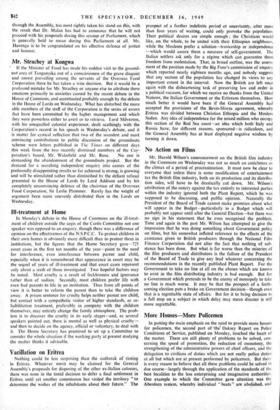Vacillation on Eritrea
Nothing could be less surprising than the outbreak of rioting in Eritrea. Whatever merit may be claimed for the General Assembly's proposals for disposing of the other ex-Italian colonies, there was none in the timid decision to defer a final settlement in Eritrea until yet another commission has visited the territory " to determine the wishes of the inhabitants about their future." The prospect of a further indefinite period of uncertainty, after more than four years of waiting, could only provoke the population. Their political desires are simple enough ; the Christians would like, on the whole, to be united with their Ethiopian neighbours, while the Moslems prefer a solution—trusteeship or independence —which would assure them a measure of self-government. The Italian settlers ask only for a regime which can guarantee them freedom from molestation. That, in broad outline, was the assess- ment of the position made by the Big Four's commission of enquiry which reported nearly eighteen months ago, and nobody suggests that any section of the population has changed its views to any important extent in the interval. Now the British are left once again with the disheartening task of preserving law and order in a political vacuum, for which we receive no thanks from the United Nations, the Italian Government or the Eritreans themselves. How much better it would have been if the General Assembly had accepted the provisions of the Bevin-Sforza agreement, whereby Eritrea was divided between Christian Ethiopia and the Moslem Sudan. Any idea of independence for the mixed million who occupy this section of the Red Sea coast—an idea which both' Italy and Russia have, for different reasons, sponsored—is ridiculous, and the General Assembly has at least displayed negative wisdom by turning it down.


































 Previous page
Previous page